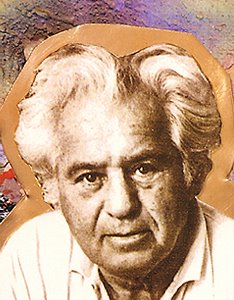 It’s odd that Silliman’s announcement of Layton’s death elicited only two comments – mine, where I posted the poem below, and some one else saying how shocking it was that the announcement of the death of Canada’s “most famous poet” only prompted one comment.
It’s odd that Silliman’s announcement of Layton’s death elicited only two comments – mine, where I posted the poem below, and some one else saying how shocking it was that the announcement of the death of Canada’s “most famous poet” only prompted one comment.My first reaction was: What a bunch of ignorant egg-heads!
I give Ron credit, tho, for being generally up on Canadian poetry– he’s reviewed at least a couple about anthologies of our verse before I became aware of them, and he knows many of our poets, at least by name, probably better than I do -- but it’s telling he didn’t have anything more to say on Layton than splash his photo as if he were some rock star. Of course the “spatial and cognitive” gains more space and commentary than anything so traditional (yet wild) as this most Unquiet UnBritish Poet of So-Called Quietude… but I’m sure Ron would argue, and rightfully so, where else in blogland is “spatial and cognitive” poetry given such unlimited space? That’s his focus; it is his blog. But it would be nice for him to transcend his own self-imposed limitations once in a while. (Wouldn’t it be nice for us all…)
Back to Layton:
At this point, almost two weeks after his death, so much has been said on him elsewhere that it seems redundant to make yet another eulogy for this fighter, firebrand, and lion-like champion of poetry (there, that’s my eulogy). My only contribution to the discussion may be to point out that Enneagram-wise, Layton was an exemplar of an 8 with a 7-wing (which Don Richard Riso labels “The Maverick”… interesting that a Globe and Mail headline proclaimed him recently as “Canada’s Maverick Poet”)… an unusual number for a poet. To enthusiasts of both the Enneagram and Layton, this may be obvious (but how many of us are there? maybe one or two).
Layton’s inner “mantra” which he constantly reformulated to himself and broadcast to the world: The world is an unjust place, and I defend the innocent. Of course, “the innocent” was all too often himself, who he defended with his fists (as he says, in childhood) and (in adulthood, probably childhood too) all the powers of his impressive vocabulary. But when that innocent was a suffering prisoner or poet or bird or cat or bull calf, he could call forth a compassion that was truly breathtaking in its depth and largeness of spirit. If you turn to pp. 332-334 of Don Richard Riso’s Personality Types, you’ll see the dynamic of Layton's persona described practically to a tee. An extract that could describe him at his best:
The healthy Eight’s charisma combines with the healthy Seven’s capacity to enjoy life, producing an extraordinarily outgoing personality, often attracting many people and involving them in their hopes and plans. They create opportunities for others and enjoy challenging people to make something of themselves. There is a joyful enthusiasm for living life and sharing their experience and fortitude. Their inner strength and vitality may be so outstanding as to allow Eights with a Seven-wing to have a public, and possibly historical, impact. Their magnanimity will have a practical focus in the concern they show for the material well-being of others.
And at his worst:
Unhealthy persons of this subtype are ruthless and impulsive: they can say or do things that will later be regarded as either a stroke of genius or a fatal mistake. They can be offensive and tyrannical, verbally and physically brutish to others, lashing out at whoever has frustrated them or dared resist their wills. They have explosively violent tempers and quickly get into a rage. They easily feel betrayed and resist any restraints upon their behaviour. Their manic tendencies reinforce their delusions of omnipotence: they may spend vast amounts of money to feed their to feed their inflated notions of themselves. (I don’t know how far he went in this regard…) They tend to get out of control when they are anxious or feel threatened. Since they are susceptible to anxiety, they defend themselves against it by acting out, impulsively striking first, attempting to destroy before they are destroyed.
In all…
… robust, earthy, materialistic… feet firmly planted on the ground, but… not beyond seeking attention and regaling people with stories and “straight talk”. Even if … of limited financial means, Eights with a Seven-wing like to throw money around and have “nights on the town”. The Seven-wing also adds a degree of hyperbole, so they tend to make big promises and exaggerate situations in an effort to recruit others into their schemes.
Sounds like him? Those who are interested in exploring the Enneagram – a complex, enigmatic personality typology that can lead to literally clairvoyant insight into oneself and others -- should read Helen Palmer’s The Enneagram, and Don Richard Riso's and Ross Hudson’s Personality Types and Wisdom and the Enneagram. The Riso/Hudson Enneagram Institute site probably provides the completest information on the net.
But enough typecasting for the moment.
Layton did write a lot of dreck, all of it, however, a lively sort of dreck. Much of his work is a mixed bag of true inspiration and excess -- a source of fascination in itself, how a man could be so brilliant and yet at times aesthetically blind. Below though is one of Layton's stellar poems, that although much celebrated and anthologized, I’ve been unable to find up to now in its entirety on the net.
